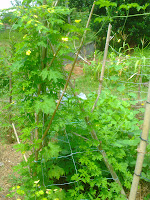
As part of our vision, we are starting this project to teach ourselves the importance of saving seeds and to learn its value on our culture, future survival, and struggle for self-determination and sufficiency. We firmly believe that without recognizing the importance of seed saving and its science, we cannot fully understand how our existence evolve in so many ways in relation to the food that sustain and nourish us. Our subsistence fully depended on our food and its ability to cope up with the rapidly changing environment; we are trying to give toxins and carcinogens to our environment that's why we also get the same in return. Through genetic engineering, pesticide application, and other unnatural process we inflict to our soil, water, and air, we are literally committing suicide. But there are people/organizations who are working hard to establish a solid foundation on defending every person's right to plant and save his/her own seeds without restriction. For a very long time, they are risking their lives to protect and uplift this very important notion for the good of all! One of these is the Navdanya's Seed Freedom Project (Please click here to listen to Vandana Shiva calling for support). Therefore, we are expressing our support for this campaign and hopefully, together we can be effective to help ourselves realized a world without oppressive corporations and government committing and promoting bio-piracy, ecological brutality, and suicide economy.

In addition, we would like to add these statements from
GLOBAL MOVEMENT TO DEFEND SEED FREEDOM
Seed is the source of life and the first link in the food chain. Control over seed means a control over our lives, our food and our freedom. Corporations like Monsanto have created a seed emergency – an emergency through patents on seeds, seed monopolies, biopiracy, genetic engineering and creation of non -renewable sterile seeds. Seed monopolies have pushed 250,000 farmers to commit suicide in India. After contaminating farmer’s seeds and crops, Monsanto sues farmers “for stealing their gene”, putting the polluter
pays principle on its head, and making it the polluter gets paid principle. The multidimensional emergency created by patents on seeds and GMOs needs a global collective response. Collectively, we must stop the patenting of seeds. Join the Global movement on Seed Freedom to stop the corporate hijack of seed and with it, the hijack of our freedom and our future.
Declaration on Seed Freedom
1. Seed is the source of life, it is the self urge of life to express itself, to renew itself,to multiply, to evolve in perpetuity in freedom.
2. Seed is the embodiment of bio cultural diversity. It contains millions of years of biological and cultural evolution of the past, and the potential of millennia of a future unfolding.
3. Seed Freedom is the birth right of every form of life and is the basis for the protection of biodiversity.
4. Seed Freedom is the birth right of every farmer and food producer. Farmers rights to save, exchange, evolve, breed, sell seed is at the heart of Seed Freedom. When this freedom is taken away farmers gettrapped in debt and in extreme cases commit suicide.
5. Seed Freedom is the basis of Food Freedom, since seed is the first link in the food chain.
6. Seed Freedom is threatened by patents on seed, which create seed monopolies and make it illegal for farmers to save and exchange seed. Patents on seed are ethically and ecologically unjustified because patents are exclusive rights granted for an invention. Seed is not an invention. Life is not an invention.
7. Seed Freedom of diverse cultures is threatened by Biopiracy and the patenting of indigenous knowledge and biodiversity. Biopiracy is not innovation – it is theft.
8. Seed Freedom is threatened by genetically engineered seeds, which are contaminating our farms, thus closing the option for GMO-free food for all. Seed Freedom of farmers is threatened when after contaminating our crops, corporations sue farmer for “stealing their property”.
9. Seed Freedom is threatened by the deliberate transformation of the seed from a renewable self generative resource to a non renewable patented commodity. The most extreme case of non renewable seed is the “Terminator Technology” developed with aim to create sterile seed.
10.We commit ourselves to defending seed freedom as the freedom of diverse species to evolve; as the freedom of human communities to reclaim open source seed as a commons.
To this end, we will save seed.
We will create community seed banks and seed libraries.
We will not recognize any law that illegitimately makes seed the private property of corporations.
We will stop the patents on seed.
Please support and write to them at:
info@seedfreedom.in or vandana@vandanashiva.com
































.JPG)
.JPG)






.JPG)
.JPG)
.JPG)
.JPG)




















